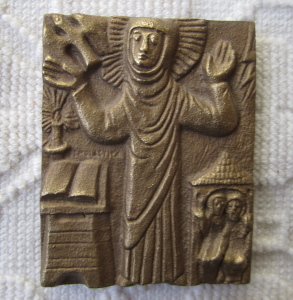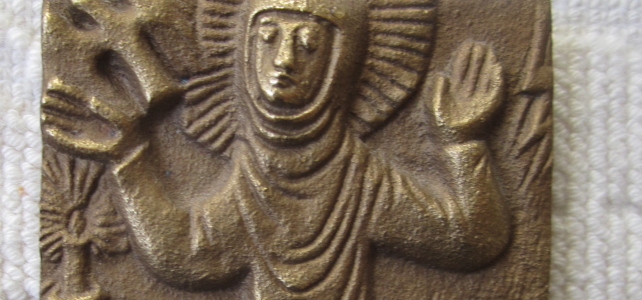
PHOTO:Mary van Balen
Originally appeared in The Catholic Times, Feb 8, 2015
Tuesday, February 10 is the feast of Saint Scholastica. What we know of her comes from St. Gregory the Great’s famous biography of St. Benedict, though other stories were later written about her. Scholastica is Benedict’s twin sister, both born into a wealthy family of Nursia, Italy in 480. As was the custom, Benedict went to Rome to study while Scholastica likely lived in a convent where she learned to read and write as well as participated in the prayer life of the nuns.
Some stories recount her founding a religious community near her brother’s monastery at Monte Cassino, and becoming prioress. The most famous account of her, though, is found in chapters 33 and 34 in Book II of Gregory’s Dialogues.
As was their custom, once a year Benedict, accompanied by some of his monks, met his sister at a house partway between her convent and his monastery. They shared food and conversation concerning spiritual matters. On this particular visit, just three days before her death, Scholastica wanted her brother to stay longer. Perhaps she sensed it would be their last time together. They talked until darkness fell, and she asked him to spend the night “…that they might spend it in discoursing of the joys of heaven.”
Benedict would have none of it, saying that he couldn’t spend the night away from the Abbey. That was the rule, after all.
Not giving up, Scholastica put her head down on the table, laying it on her folded hands, and prayed. As she prayed, a storm came and filled the clear night sky with thunder and lightening. She lifted her head, tears streaming from her eyes, and heavy rain poured from the heavens. Benedict and his monks couldn’t return to the Abbey in such a storm.
“God forgive you, what have you done?” Benedict asked. Scholastica answered with a bit of attitude: “I desired you to stay, and you would not hear me; I have desired it of our good Lord, and he has granted my petition. Therefore if you can now depart, in God’s name return to your monastery, and leave me here alone.”
Of course, Benedict and his monks spent the night, the brother and sister enjoying long conversations until morning. Love, it seemed, trumped the Rule, at least in this case. As St. Gregory wrote: “He found, however, that a miracle prevented his desire. A miracle that, by the power of almighty God, a woman’s prayers had wrought. Is it not a thing to be marveled at, that a woman, who for a long time had not seen her brother, might do more in that instance than he could? She realized, according to the saying of St. John, “God is charity” [1 John 4:8]. Therefore, as is right, she who loved more, did more.”
Whether truth or legend, the story shows the power of love and the importance of listening with the heart. Benedict was right in stating that he and the other monks should return to the monastery. Yet, Scholastica’s desire, born of deep affection for her brother and her longing to continue their conversation and praise of God together, was worthy of bending the rules, even Benedict’s.
How often are we confronted with such a choice? Can you recall times when rigidly holding fast to a tradition or rule has worked not to foster growth and love, but instead to injure and alienate? Clinging to what we think we know is “right” may blind us to the reality of others’ lives and wisdom.
Rules and traditions are important. Benedict’s Rule has proven itself over centuries, leading monastics, helping them live, work, and pray together in community. It has also been a guide for many as they strive to balance prayer, work, study, and recreation in their lives with family and friends, and in their workplaces.
Benedict understood the necessity of responding to particular moments and particular needs in ways that are outside the usual response. His Rule is full of such examples. Still, in this story, it was Scholastica who was listening with the ear of the heart and who found God listening to her.
© 2015 Mary van Balen

Speak Your Mind